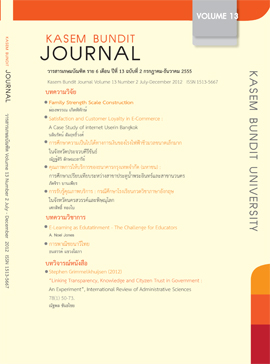Family Strength Scale Construction
Keywords:
Family Strength Scale, Construction, แบบวัดความเข้มแข็งของครอบครัว, การสร้างAbstract
The objectives of this research were to construct a family strength scale: an instrument assessing social and psychological characteristics which created a sense of positive family identity and to determine the normative data for the family strengths. The research methods included the scale development and the normative data. The first step in scale development involved explicitly defining the concept of family strength, examined several measures of family strength and reviewed available research on strong family. Thus, the scale development strategies included the theoretical component and the structural component. Statistical analyses were conducted, which examined the content validity, the discriminatory power of each item, scale reliability, inter-correlation among scales, and the confirmatory factor analysis.
From these analyses a 71-item instrument, designated Family Strength Scale (FSS), was developed. The FSS comprised of six strength themes: affection and affiliation, positive communication, togetherness, valuing each other, religious and moral beliefs, and problem coping strategies. The FSS utilized a five-point Likert scale for each of the items. The reliability of FSS was .979. Besides, the FSS measurement models was fitted to the empirical
data with constructive reliability of .98 and its variance extracted of .77. Also, the FSS was designed to be self-administered and took 20-25 minutes to complete. It was simple to administer and could be given individually or in groups. The respondent needed only a test booklet and an answer sheet.
The normative data for the FSS came from an analysis of 1,940 family members: 498 fathers, 647 mothers, and 795 adolescent sons and daughters. Descriptive statistics (mean, standard deviation), T-scores, percentile ranks, and the FSS manual were given in the research report.The research analysis showed that the family strength T-scores of this research ranged from 15 to 77 and the percentile ranks ranged from .02-99.69 while the total scores of the family strengths ranged from 100 to 355.
In the conclusion, the FSS had the advantage of being grounded in assisting families and family members to recognize their own strengths and to use these qualities to strengthen their resilience against the challenge of family life. Other research projects were suggested which would continue to increase the understanding of family strengths.
การวิจัยนี้มีวัตถุประสงค์เพื่อสร้างแบบวัดความเข้มแข็งของครอบครัว ซึ่งเป็นเครื่องมือที่ใช้วัดหรือประเมินคุณลักษณะทางสังคมและทางจิตวิทยาที่ช่วยรังสรรค์เอกลักษณ์ของครอบครัว และหาเกณฑ์ปกติหรือปกติวิสัยของความเข้มแข็งของครอบครัว สำหรับขั้นตอนแรกของการสร้างแบบวัดคือ กำหนดแนวคิดของความเข้มแข็งของครอบครัว สำรวจรูปแบบต่างๆ ของการวัดความเข้มแข็งของครอบครัว ศึกษาเอกสารและงานวิจัยที่เกี่ยวข้อง โดยกลยุทธ์ในการสร้างแบบวัดนั้นครอบคลุมองค์ประกอบเชิงทฤษฎีและองค์ประกอบเชิงโครงสร้าง ส่วนสถิติที่ใช้ในการวิเคราะห์ข้อมูล ได้แก่ การตรวจสอบความตรงเชิงเนื้อหา การวิเคราะห์หาค่าอำนาจจำแนกรายข้อ การหาค่าความเที่ยง การหาค่าสัมประสิทธิ์สหสัมพันธ์ระหว่างตัวแปรชี้วัด และการตรวจสอบความตรงเชิงโครงสร้างโดยการวิเคราะห์องค์ประกอบเชิงยืนยัน
ผลการวิเคราะห์ข้อมูลได้แบบวัดความเข้มแข็งของครอบครัว จำนวน 71 ข้อ ประกอบด้วยความเข้มแข็งของครอบครัว 6 ด้าน คือ ด้านความรักความผูกพัน ด้านการสื่อสารทางบวก ด้านการใช้ชีวิตร่วมกัน ด้านการเห็นคุณค่าของกันและกัน ด้านการยึดมั่นในศาสนาและธรรมจริยา และด้านการมีกลยุทธ์ในการเผชิญปัญหา แบบวัดความเข้มแข็งของครอบครัวนี้เป็นแบบวัดแบบ Likert กำหนดคำตอบเป็น 5 ระดับ และใช้เวลาในการตอบแบบวัดประมาณ 20-25 นาที รวมทั้งสามารถนำไปใช้ทดสอบเป็นกลุ่มหรือรายบุคคล โดยแบบวัดที่นำไปใช้วัด ควรจัดพิมพ์เป็นรูปเล่มและมีกระดาษคำตอบแยกไว้ต่างหาก แบบวัดนี้มีค่าความเที่ยงเท่ากับ .979 และโมเดลการวัดองค์ประกอบของความเข้มแข็งของครอบครัวมีความเหมาะสมพอดีกับข้อมูลเชิงประจักษ์ และมีค่า Construct Reliability (Pc) เท่ากับ .98 และมีค่า Variance Extracted (Pv) เท่ากับ .77
ส่วนเกณฑ์ปกติหรือปกติวิสัยของแบบวัดความเข้มแข็งของครอบครัวได้มาจากการวิเคราะห์คำตอบการตอบแบบวัดดังกล่าวของกลุ่มตัวอย่างที่เป็นสมาชิกครอบครัว จำนวน 1,940 คน ประกอบด้วย บิดา จำนวน 498 คน มารดา จำนวน 647 คน และบุตรธิดาที่อยู่ในวัยรุ่น จำนวน 795 คน ผลการวิเคราะห์เกณฑ์ปกติของความเข้มแข็งของครอบครัว นำเสนอในรูปค่าเฉลี่ย ค่าส่วนเบี่ยงเบนมาตรฐาน T-scores ตำแหน่งเปอร์เซนไทล์ รวมทั้งนำเสนอคู่มือของแบบวัดความเข้มแข็งของครอบครัวในรายงานการวิจัย
ผลการวิเคราะห์ข้อมูลของการวิจัยครั้งนี้ พบว่า ค่าคะแนนมาตรฐานปกติ T-score ของคะแนนความเข้มแข็งของครอบครัวมีค่าอยู่ระหว่าง 15-77 และตำแหน่งเปอร์เซนไทล์อยู่ระหว่าง .02-99.69 โดยมีคะแนนความเข้มแข็งของครอบครัวโดยรวมอยู่ระหว่าง 100-355
กล่าวโดยสรุป แบบวัดความเข้มแข็งของครอบครัวเป็นเครื่องมือที่จะช่วยให้ครอบครัวและสมาชิกของครอบครัวได้ทราบถึงความเข้มแข็งของครอบครัวตามความคิดความรู้สึกของเขา และจะเป็นประโยชน์ต่อการพัฒนาชีวิตครอบครัวให้มั่นคงยิ่งขึ้น รวมทั้งจะมีคุณค่าต่องานวิจัยอื่นๆ หากสามารถดำเนินการศึกษาเพื่อที่จะทำความเข้าใจเกี่ยวกับความเข้มแข็งของครอบครัวต่อไป
Downloads
How to Cite
Issue
Section
License
ทัศนคติ ความคิดเห็นใด ๆ ที่ปรากฏในวารสารเกษมบัณฑิตฉบับนี้เป็นของผู้เขียน โดยเฉพาะ มหาวิทยาลัยเกษมบัณฑิตและบรรณาธิการ ไม่จำเป็นต้องมีความเห็นพ้องด้วย







